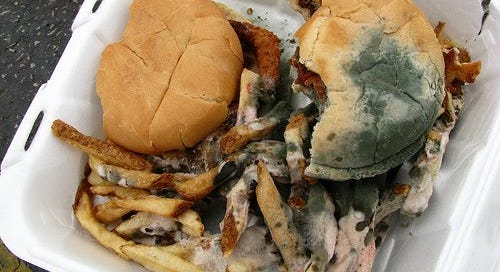Lost in Translation: Matthew 23:25
"Woe to you, teachers of the law and Pharisees, you hypocrites! You clean the outside of the cup and dish, but inside they are full of greed and self-indulgence." (NIV)
The verse of Matthew 23:25 contains a mistranslation at the end that destroys its meaning as well as its shock value. As translated, this verse looks like a simple criticism of Jesus’s opponents based on a religious practice. Jesus was doing something more, shocking his listeners with a warning.
In translation, the verse says:
NIV: Woe to you, teachers of the law and Pharisees, you hypocrites! You clean the outside of the cup and dish, but inside they are full of greed and self-indulgence.
This is, at best, an indirect criticism, and a somewhat nonsensical one. It has them eating greed.
The Humor
The first line indicates that Jesus said this in a lighthearted way. Jesus seldom criticizes others without first making light of his opinion. This beginning also makes the shocking ending more of a surprise.
The first word translated as "woe" is a Jesus fun word. It means "too bad" or "boo-hoo" to you. It is very like the Yiddish, oy vey, even in its sound in Greek, ou-ai.
The punchline of this sentence is another fun word, translated as “hypocrites.” As we explain in this earlier article:
Jesus often used hypokrites, meaning "actors," to describe “virtue signaling,” demonstrations of public holiness. Jesus is making fun of people in a light-hearted way by calling them “actors.” Maybe saying something in English like, "You are so Hollywood!" would come close…
The word “actors” is the first indication that Jesus’s topic is false actions used for playing a part, virtue signaling. In Jesus’s time, virtue was about how strictly people followed Judean customs. Today, people use virtue signaling to show that they are part of an enlightened tribe. If they speak against that religion, they are criticized and, if possible, silenced.
How would Jesus’s listeners hear his first line? Like this:
Listeners Heard: Boo-hoo for you, writers and distinguished actors.
The Greek word translated as “teachers of the law” means “writers.” It is more accurately translated in the KJV as “scribes.” During Jesus’s times, those who could write were also readers. They read the religious boos at meetings.
The only other noun here is “actors. The word pharisees is used as an adjective. Pharisee is an Aramaic word that means “distinguished.” Jesus combined it with the name of the sect to form “distinguished actors,” a contradiction in terms.
Inside and Outside
Jesus uses three tools to make this lesson memorable: 1) vivid contrast, 2) words that can be acted out, and, of course, 3) setups and punchlines. Here, he uses all three. This first part is a setup to provide context so the shocking punchline will be a surprise.
Listeners Heard: Because you clean the outside of the cup and the meat platter. Inside, however…
He starts with the contrast between the visible outside and the hidden inside. These adverbs are like their English versions, the same root with different prefixes meaning “in” and “out." In five places, most of the verses in which these words appear, Jesus uses them where they are directly contrasted to mean hidden and visible.
“Inside” is used clearly to mean people’s hidden feelings, usually bad ones, Mark 7:21 (“For from within, out of the heart of men”) and Mark 7:23 (All these evil things come from within...). The idea is that inside are the things we want to conceal. Outside is what we want to show others.
The verb here means “to clean.” This is a verb that can be acted out in an exaggerated way.
But cleaning the outside of items used for eating was not a part of Jewish law. Nor was the washing of hands before meals. The commandment of Moses is that the priests should wash before entering the temple. The handwashing with meals is from the Talmud (written down two hundred years later) as the teachings of the Jewish scholars who began with the Pharisees.
This rule must have been expanded to include washing the outside of dishes. Since dishes get dirty on the outside, those using them would get their hands dirty. The law-abiding were taught to wash their hands and tableware. This is a good practice, but not always practical, so it is not Divine law. It was easier for scholars than most Judeans who worked outside, in the fields or on boats.
Notice the issue is not washing the entire dish, but just the outside. Old food on the inside was fine.
The Punchline
The last clause of this verse about being full is the punchline. The “are full” is not the common verb that means “make full.” It is an uncommon word for Jesus, more like “are loaded.” Jesus used this verb because it takes an object. With an object, it means “full of” that object. The problem is that Jesus doesn’t use an object. What looks like an object is a preposition phrase.
Keep reading with a 7-day free trial
Subscribe to Rediscovering Jesus's Words to keep reading this post and get 7 days of free access to the full post archives.




